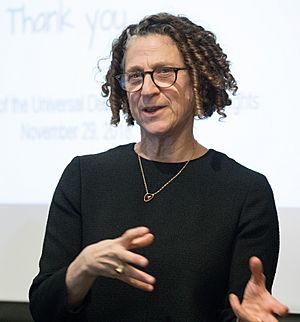Cynthia Dwork facts for kids
Quick facts for kids
Cynthia Dwork
|
|
|---|---|

Dwork lectures at Harvard Kennedy School in 2018
|
|
| Born | June 27, 1958 |
| Alma mater | Princeton University (BSE) Cornell University (PhD) |
| Known for | Differential privacy Non-Malleable Cryptography Proof-of-work |
| Awards |
|
| Scientific career | |
| Fields | Computer science |
| Institutions | IBM Research Microsoft Research Harvard University |
| Thesis | Bounds on Fundamental Problems in Parallel and Distributed Computation (1984) |
| Doctoral advisor | John Hopcroft |
Cynthia Dwork (born June 27, 1958) is a brilliant American computer scientist. She is famous for her work in cryptography (making information secret and secure), distributed computing (computers working together), and making sure computer programs are fair. She helped create important ideas like differential privacy and proof-of-work.
Today, Cynthia Dwork works at Harvard University. She is a professor of Computer Science and also teaches at the Radcliffe Institute for Advanced Study and Harvard Law School. She even teaches in Harvard's Statistics Department.
Contents
Early Life and Education
Cynthia Dwork started her journey in computer science at Princeton University. She earned her first degree there in 1979. She graduated with honors and received an award for her excellent independent research.
Later, she went to Cornell University. In 1983, she earned her Ph.D. (a very advanced degree). Her research there was guided by her professor, John Hopcroft.
Amazing Discoveries in Computer Science
Cynthia Dwork is well-known for her research on keeping data private. She found ways to analyze information without revealing personal details.
What is Differential Privacy?
In the early 2000s, she helped invent something called differential privacy. This is a strong way to protect people's information. It lets researchers study large sets of data and get accurate results. But it does this without letting anyone find out specific details about individuals in the data.
Imagine a big survey. Differential privacy makes sure that if your answer is included or not, the overall results look almost the same. This is usually done by adding tiny bits of "noise" or random changes to the data. This way, your personal information stays safe.
Fairness in Algorithms
Cynthia Dwork also studies how to make computer programs fair. She looks at programs that make important decisions, like which ads you see online. She wants to make sure these programs don't treat people unfairly.
Contributions to Cryptography and Distributed Computing
She has also made big contributions to cryptography and distributed computing. She even won the Edsger W. Dijkstra Prize for her early work. This work helped create systems that can keep working even if some parts fail.
- Non-Malleable Cryptography: In 1991, with Danny Dolev and Moni Naor, she helped create "non-malleable cryptography." This means that if someone tries to change a secret message, they can't make it look like a different valid message.
- Lattice-Based Cryptography: In 1997, with Miklós Ajtai, she developed the first "lattice-based" cryptosystem. This was a new way to make secure codes. It was also the first public-key system where breaking the code is as hard as solving a very difficult math problem.
- Proof-of-Work: With Moni Naor, she came up with the idea of "proof-of-work." This is a technique to fight e-mail spam. It requires a computer to do a small amount of work before sending an email. This makes it harder for spammers to send millions of emails. This idea is now a key part of technologies like bitcoin.
Awards and Special Recognitions
Cynthia Dwork has received many important awards and honors for her groundbreaking work.
- In 2007, she won the Dijkstra Prize for her work on how computers reach agreement, known as "consensus problems."
- In 2009, she received the PET Award for her excellent research in technologies that improve privacy.
- In 2016 and 2017, she and her co-authors won the TCC Test-of-Time Award and the Gödel Prize. These awards were for their important paper that first introduced differential privacy.
- In 2020, she was awarded the IEEE Richard W. Hamming Medal. This was for her foundational work in privacy, cryptography, and distributed computing. It also recognized her leadership in developing differential privacy.
- She was also the winner of the Knuth Prize in 2020.
- In 2021, she shared the ACM Paris Kanellakis Theory and Practice Award for her contributions to differential privacy.
- In 2022, she was a co-winner of the RSA Award for Excellence in Mathematics. This was for her work on the foundations of privacy and cryptography.
- Also in 2022, her 1991 paper on "Non-Malleable Cryptography" won a STOC 30-year Test-of-Time award.
- Most recently, in 2025, Cynthia Dwork was honored with the National Medal of Science. This is one of the highest awards a scientist can receive in the United States.
Personal Life
Cynthia Dwork comes from a family of smart people. Her father, Bernard Dwork, was a mathematician. Her sister, Debórah Dwork, is a historian.
Outside of her computer science work, Cynthia Dwork is also very active. She holds a black belt in taekwondo, a Korean martial art!
See also
 In Spanish: Cynthia Dwork para niños
In Spanish: Cynthia Dwork para niños
 | Laphonza Butler |
 | Daisy Bates |
 | Elizabeth Piper Ensley |

